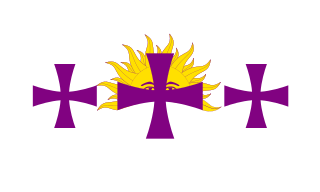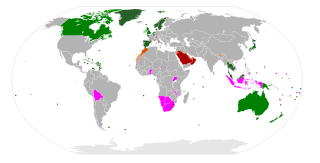Hispanic Monarchy and Spanish Monarchy may refer to:
- the 1479-1716 period of the Spanish Empire (Hispanic Monarchy (Political entity)) that is divided in:
- the Monarchy of Spain
Hispanic Monarchy and Spanish Monarchy may refer to:

Constitutional monarchy, also known as limited monarchy, parliamentary monarchy or democratic monarchy, is a form of monarchy in which the monarch exercises their authority in accordance with a constitution and is not alone in making decisions. Constitutional monarchies differ from absolute monarchies in that they are bound to exercise powers and authorities within limits prescribed by an established legal framework.
A monarch is a head of state for life or until abdication, and therefore the head of state of a monarchy. A monarch may exercise the highest authority and power in the state, or others may wield that power on behalf of the monarch. Usually a monarch either personally inherits the lawful right to exercise the state's sovereign rights or is selected by an established process from a family or cohort eligible to provide the nation's monarch. Alternatively, an individual may proclaim oneself monarch, which may be backed and legitimated through acclamation, right of conquest or a combination of means.
Spanish might refer to:
Republican can refer to:

The term Hispanic refers to people, cultures, or countries related to Spain, the Spanish language, or Hispanidad broadly. In some contexts, especially within the United States, "Hispanic" is used as an ethnic or meta-ethnic term.

Ferdinand VII was King of Spain during the early 19th century. He reigned briefly in 1808 and then again from 1813 to his death in 1833. Before 1813 he was known as el Deseado, and after, as el ReyFelón.

The monarchy of Spain or Spanish monarchy is the constitutional form of government of Spain. It consists of a hereditary monarch that reigns as the head of state, being the highest office of the country. The current King is Felipe VI since 19 June 2014, after the abdication of his father, King Juan Carlos I.
A viceroyalty was an entity headed by a viceroy. It dates back to the Spanish conquest of the Americas in the sixteenth century.

The National Day of Spain is a national holiday held annually on 12 October. It is also traditionally and commonly referred to as the Día de la Hispanidad, commemorating Spanish legacy worldwide, especially in Hispanic America.

The Political Constitution of the Spanish Monarchy, also known as the Constitution of Cádiz and as La Pepa, was the first Constitution of Spain and one of the earliest codified constitutions in world history. The Constitution was ratified on 19 March 1812 by the Cortes of Cádiz, the first Spanish legislature that included delegates from the entire nation and its possessions, including Spanish America and the Philippines. "It defined Spanish and Spanish American liberalism for the early 19th century."

Hispanic and Latino Americans are Americans of Spanish and/or Latin American ancestry. These demographics include all Americans who identify as Hispanic or Latino regardless of ancestry. As of 2020, the Census Bureau estimated that there were almost 65.3 million Hispanics and Latinos living in the United States and its territories.

Chicano English, or Mexican-American English, is a dialect of American English spoken primarily by Mexican Americans, particularly in the Southwestern United States ranging from Texas to California, as well as in Chicago. Chicano English is sometimes mistakenly conflated with Spanglish, which is a mixing of Spanish and English; however, Chicano English is a fully formed and native dialect of English, not a "learner English" or interlanguage. It is even the native dialect of some speakers who know little to no Spanish, or have no Mexican heritage.
The ideas of the Age of Enlightenment came to Spain in the 18th century with the new Bourbon dynasty, following the death of the last Habsburg monarch, Charles II, in 1700. The period of reform and 'enlightened despotism' under the eighteenth-century Bourbons focused on centralizing and modernizing the Spanish government, and improvement of infrastructure, beginning with the rule of King Charles III and the work of his minister, José Moñino, count of Floridablanca. In the political and economic sphere, the crown implemented a series of changes, collectively known as the Bourbon reforms, which were aimed at making the overseas empire more prosperous to the benefit of Spain.

The Cortes of Cádiz was a revival of the traditional cortes, which as an institution had not functioned for many years, but it met as a single body, rather than divided into estates as with previous ones.
Hispanophobia or anti-Spanish sentiment is a fear, distrust, hatred of, aversion to, or discrimination against Hispanic, Latino and/or Spanish people, and/or Hispanic culture.
Latino or Latinos refers to:
A composite monarchy is a historical category, introduced by H. G. Koenigsberger in 1975 and popularised by Sir John H. Elliott, that describes early modern states consisting of several countries under one ruler, sometimes designated as a personal union, who governs his territories as if they were separate kingdoms, in accordance with local traditions and legal structures. The composite state became the most common type of state in the late medieval and early modern era in Europe. Koenigsberger divides composite states into two classes: those, like the Spanish Empire, that consisted of countries separated by either other states or by the sea, and those, like Poland–Lithuania, that were contiguous.

The Capture of Hormuz was a combined Anglo-Persian expedition that successfully captured the Portuguese garrison at Hormuz Island after a ten-week siege, thus opening up Persian trade with England in the Persian Gulf. Before the capture of Hormuz, the Portuguese had held the Castle of Hormuz for more than a century, since 1507 when Afonso de Albuquerque established it in the capture of Hormuz, giving them full control of the trade between India and Europe through the Persian Gulf. According to Stephen Neill, the capture of Hormuz entirely changed the balance of power and trade.

Monarchism is the advocacy of the system of monarchy or monarchical rule. A monarchist is an individual who supports this form of government independently of any specific monarch, whereas one who supports a particular monarch is a royalist. Conversely, the opposition to monarchical rule is referred to as republicanism.

Netherlands–Spain relations are the bilateral relations between the Netherlands and Spain. The relations between both countries are defined mainly by their membership in the European Union and by being allies in the NATO.